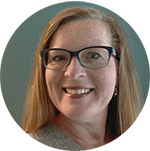Helping patients is personal: A daughter’s perspective
[Author:
LOREEN MARSHALL | Global Head, Digital Patient Support Solutions]
My 74-year-old dad would say he’s a pretty healthy guy.
Having said that, he has high blood pressure and cholesterol, needs a knee replacement, suffers from periodic bouts of gout, and has survived melanoma, bladder, and prostate cancer. Needless to say, he spends a lot of his time going to doctor appointments.
Three weeks ago, he told me that his oncologist was concerned with his blood counts and performed a bone marrow biopsy. Two weeks later, my dad went back to the oncologist and learned that he has leukemia. Here’s the ensuing text exchange:
Me: What kind of leukemia do you have?
Dad: What kinds are there?
Me: CLL, NHL, AML…
Dad: It’s NHL, but it’s not serious. They just put me on a steroid.
Me: Well, that’s good. I would guess it’s pretty slow growing given that type of treatment.
Dad: That’s what my doctor said.
Me: Is it prednisone?
Dad: I’m not sure
Me: When is your next appointment?
Dad: With my oncologist? I think it’s next Thursday, but I have an appointment with my PCP and eye doctor next week, too.
Me: Would you like me to go with you to see the oncologist? (My dad lives in IL, and I live in SC)
Dad: No, that’s not necessary. I’ll call you after the appointment and let you know how it goes. I’m not really sick at this point. I’m having my deck power washed tomorrow….
=====
The next morning, I get the following text.
Dad: FYI. I have CLL (chronic lymphocytic leukemia). Not what I told you before. I went back and checked the After Visit Summary to confirm what kind of cancer I actually have. There are so many acronyms.
Insert concerned eyeroll. 🙄
So, instead of more texting, I called my dad and had a similar Q&A exchange that again left me with very little helpful information.
I share this with you to demonstrate that while patients have access to far more information about their condition and treatment options than ever before, they often struggle to remember and access the real information, insights, and details that they need most. And that makes it equally hard for their caregivers and loved ones.
“Patients are inundated with information, and that leaves them feeling more confused than confident in their ability to manage their healthcare,” says Tara Sheehy, Director of Client Experience at Phreesia. In addition, a poll from the American Academy of Physician Associates shows that care coordination has become a second job for many patients… and such is the case for my father.
Given that so much more healthcare happens outside the doctor’s office, the need for care coordination and virtual support is paramount. Every day, I go to work to enhance and improve healthcare by creating patient-centric digital ecosystems that help patients and caregivers navigate, understand, and thrive throughout their care journey. Patients like my dad are why I work at Medocity.
To learn more about how Medocity’s digital patient support solutions can support your biosimilar product, contact Loreen Marshall at lmarshall@medocity.com.